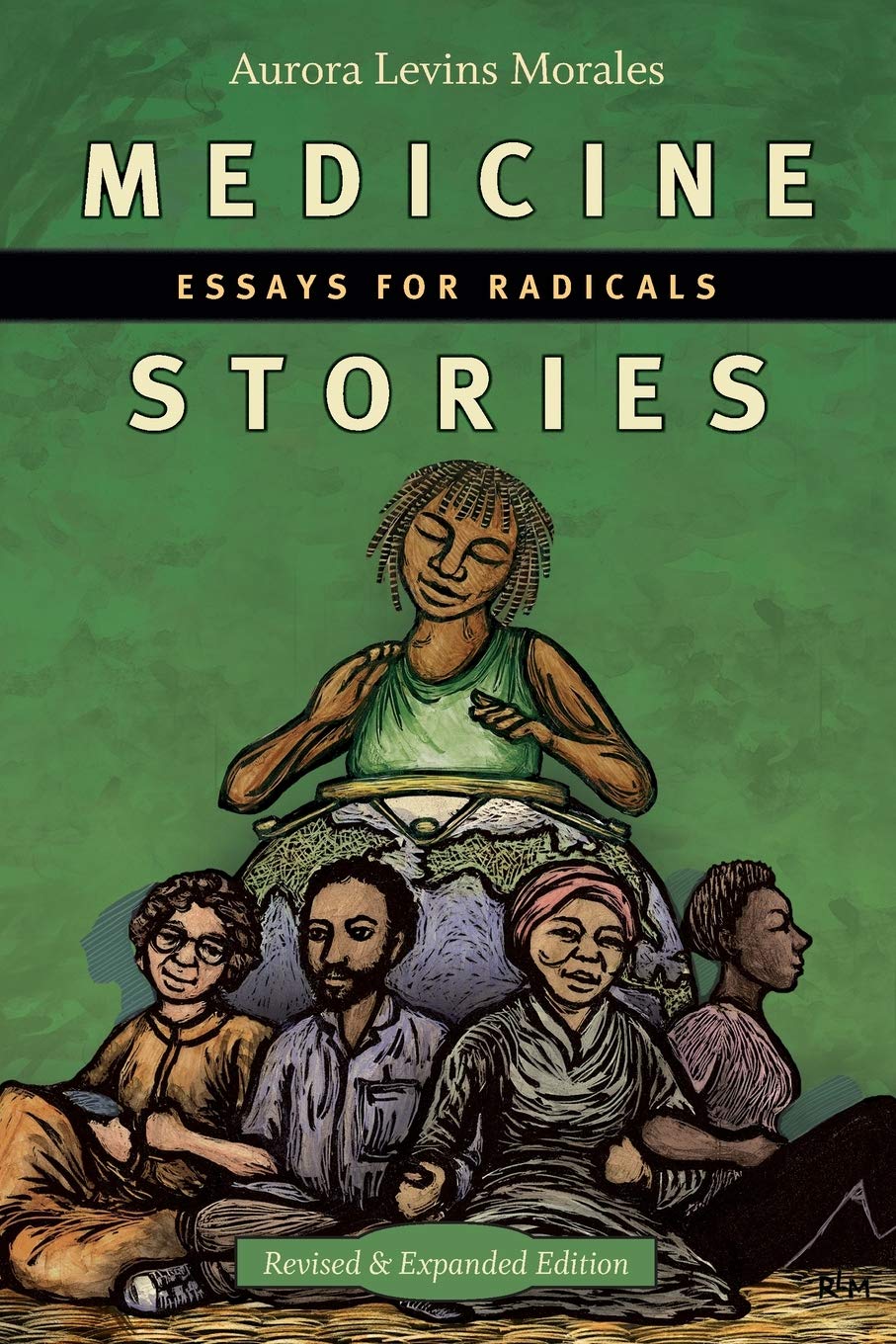
Review by Kassandra Castillo, DePaul University
Publisher: Duke University Press, 2019
Length: 232 pages
Aurora Levins Morales’s book sets the reader up on a journey through her teachings and knowledges that she has gained over the years as a Puerto Rican Ashkenazi Jewish activist. This newly revised edition that expands on the original 1998 version, takes into consideration and subtly comments on the current political, social and activists’ climate. Morales explores the complexities of working toward social justice, challenges what it means to have multiple oppressions, and continuously reminds us that liberation is not possible without every person on this planet involved, even those who have caused harm. She successfully draws from her personal experiences while providing substantial ways to either begin or continue a life toward liberation and social justice and makes her position clear throughout the entire book, on what helps her stand firm in such complexities.
Medicine Stories: Essays for Radicals is a memoir that explores what Morales deems necessary for the work toward social justice to truly make change that can last through generations. The essays not only guide you through what she has put to practice as an organizer into homemade theory but provides us with a heavy background of historical context. This context addresses the intricacies of oppression for marginalized folks, specifically Black, brown, indigenous, disabled and queer communities. She mostly speaks to and traces the history of her lineage as a Puerto Rican whose family has been both the slaved and enslaved. She grapples with learning her complex history while also encouraging us to do the same because it can motivate us to begin or continue generations of activism. Morales mentions consciousness raising throughout the book and consistently reverts back to the work she did with the Chicago Woman’s Liberation Union and describes it as, “…listening to my own discomforts, finding out who shared them, validated them, and in exchanging stories about common experiences, finding patterns, systems, explanations of how things happened.” The driving force and foundation of what she shares with her readers is that the work she has done and continues to do will always be in connection with the earth. The ways in which we attempt to understand our own internalized traumas is the beginning of better understanding those around us and their experiences. Morales has a cognizant awareness of ecology and how that directly relates to the winding roots of multiple oppressions and highlights that we must be willing to have more open discussion with people we may not particularly like. When we do this, we learn that there are others who share in our struggle or we find a way that they can connect with us to achieve the goal of total liberation. Ultimately, when people come together and share their experiences, it can reveal the inner workings of systems of oppressions and power.
What this book does well is provide the reader with lists and substantial ways to follow how to lead a radical life such as Morales’s. She does a phenomenal job of not just telling you about what she has come to learn and make sense of through all her years of organizing but tells us how to begin this work ourselves by making use of something like her “curandera’s handbook of historical practice”. This handbook lists things such as making sure you’re telling your untold stories, showing yourself in your work, and crossing borders. The author also approaches the subjects of racism, violence against women, and feminism in an academic setting with deeply personal narratives that capture the reader. Even if you do not find yourself being able to personally connect with her raw account of these topics, you will still feel pulled in.
Though you must remind yourself that these are Morales’s accounts of how she has experienced, come to know, and understand certain radical possibilities, you may find yourself wanting more clarity when it comes to some of the material. For example, in her chapter titled “Taíno Citizenship”, she discusses the exhausting back and forth conversation between those trying to claim Taíno relation down to a drop of blood, or genetics. She chooses to not take part in these discussions because ultimately what she is more concerned with is what it would look like if people were to claim their indigenousness and take responsibility for that ancestry. Morales is thoughtful about how and when she presents her indigeneity however, I fear some readers may get the wrong idea about what it means to “claim” being indigenous. As she says, identity is not just genetic but, it is important when it comes to being indigenous and could be misleading. Given that this book heavily addresses history, land and focuses on Puerto Rico, it would have perhaps been helpful for Morales to consider providing some maps. Many first-time readers that choose this book as a consideration to go down a path of social justice and activist work, may not be so familiar with the island that Morales speaks of. I believe this would have given a more distinct picture for the reader of where she came from, the various tribes she mentions, and her travels as a young girl.
Ultimately, this book is well written, and Morales uses extremely accessible language. She tends to refrain from using academic jargon, so much so that a few of these essays read as simple but powerful poetry. This book is a positive contribution to the work of learning to take and hold accountability for the self and others, actively trying to be anti-racist, working toward a more just world, and the field of women and gender studies in general. It adds to our knowledge in a way that it asks of us and does more for us than simply providing information about what a world free of injustices could look like. Morales seems to want her readers to come away with doing the work that makes us uncomfortable, that whether we like it or not, a world that is truly just for all people requires the involvement of everyone.
Kassandra Castillo recently graduated with her Master’s degree in Women’s and gender studies from DePaul University. Her research interests include Latinx feminisms, Women of Color feminisms, and interrogating curriculums and their shortcomings for secondary education students of color.
